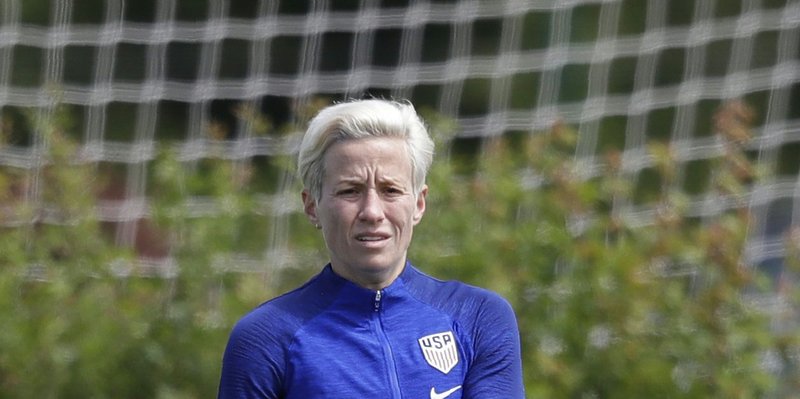PARIS -- A stroll through the City of Lights reveals few indications the Women's World Cup will kick off here tonight.
Yes, the airports are welcoming arriving fans, including thousands from the United States. Some banners and billboards decorate the streets, and magazine covers featuring the women's soccer spectacle catch the eye at corner kiosks.
But this is Paris, a glittering metropolis catering to the interests and desires of visitors seeking a variety of culture and sights.
At the moment, the French Open is veering into the late rounds at Roland Garros, an eight-minute stroll from Parc des Princes, the old soccer stadium staging the tournament opener between France and South Korea.
The 75th anniversary of D-Day, and the dignitaries visiting for the ceremonies in Normandy, has hoarded the news cycle. Summer holiday has drawn tourists to the famous museums, lovely parks and sidewalk cafes.
It's a tough market, but in many ways, it is emblematic of the struggle women's soccer has encountered for decades: trying to make itself known amid long-standing traditions and stubborn routines.
Despite the absence of great fanfare in Paris, the Women's World Cup does seem poised for a breakout moment. Globally, the sport has gained greater acceptance, as seen in attendance figures and general interest. Last month, about 5 million people in France (7.5% of the population) watched the roster announcement.
Almost 1 million tickets have been sold to the 52-game competition, 300,000 short of the total available. Local organizers say they have been selling 15,000 per day. Today's opener at 48,500-seat Parc des Princes -- home to men's superpower Paris Saint-Germain -- is among 10 sold-out matches.
For the first time, each match will stand on its own; doubleheaders, designed to limit costs and boost attendance at past Women's World Cups, have been phased out.
This tournament comes at a rebellious time.
The defending champion Americans are suing their employer, the U.S. Soccer Federation, claiming gender discrimination. The Australian players' union, among others, is calling for increases to the prize money, which is dwarfed by the payout given to men's teams.
The world's best player, Norway's Ada Hegerberg, is boycotting the tournament over what she says is mistreatment of the women's program by the country's soccer leaders.
"The incremental change we've seen is just not enough," said U.S. forward Megan Rapinoe, who has been outspoken over funding to women's programs, particularly by FIFA, the sport's ultrawealthy governing body. "I'd like to see a major paradigm shift, major overhaul and a double-down, realizing there has been such a lack of investment for all of these years and such a lack of care and attention."
Diacre said the women's game remains a work in progress.
"Women's football is very young," she said. "Not everyone is on the same page yet. Things will take time. Let's not run before we can walk. Things are improving. There will be comparisons between men and women, between salaries. It will always be a sticking point, even in society away from football."
Despite what Rapinoe and others see as financial shortfalls, the women's game has made strides. With traditional soccer-playing countries, particularly in Europe, placing greater emphasis on women's soccer, the number of competitive teams has grown.
Spain and the Netherlands are making considerable gains. England is on the brink of a prime run after multiple strong performances. Scotland and Italy are competitive.
"The level of competition four years on from the last one has exponentially increased," said U.S. Coach Jill Ellis, who oversaw the Americans' 2015 championship in Canada. "There are different teams now rising."
All seven previous World Cup titles were taken by four nations -- the United States (three), Germany (two), Japan and Norway (one apiece) -- as well as 11 of the 14 spots in the finals. (Sweden, China and Brazil are the others.)
The Americans and Germans are among the favorites again this year, but the French are legitimate championship contenders while the Australians and Dutch carry heightened ambition.
The greatest burden will fall on the hosts, who are due for a place in the final after losing in the semifinals at the 2011 World Cup and 2012 Olympics, as well as the quarterfinals of the past three European Championships.
This tournament falls a year after the men's team won the World Cup in Russia.
"When you are wearing the blue jersey, it's a huge responsibility" captain Amandine Henry said. "For us, it's the French national team, regardless whether it's men or women. The ambitions are the same."
Her coach tried tempering expectations, saying, "We want to do better, but I don't have a magic wand. I ordered it but it hasn't arrived yet."
At a glance
WOMEN'S FIFA WORLD CUP SCHEDULE
TODAY'S GAME
All times Central
France vs. South Korea, 2 p.m.
SATURDAY'S GAMES
Germany vs. China, 8 a.m.
Spain vs. South Africa, 11 a.m.
Norway vs. Nigeria, 2 p.m.
SUNDAY'S GAMES
Australia vs. Italy, 6 a.m.
Brazil vs. Jamaica, 8:30 a.m.
England vs. Scotland, 11 a.m.
Sports on 06/07/2019
